Want to attend the course but can’t make it on this date?
Fill in your details below and we’ll notify you when we next present a course in this area:
As a youngster growing up in Woodlands in Durban, I never feared snakes. But that was not the case with the rest of my family. My first snake encounter in our garden was a Brown House Snake and my mother insisted that we killed it. It was an unpleasant experience and the beginning of my fascination with snakes.
Snake encounters were frequent and in virtually every instance the snake was killed. While visiting friends in Blythedale Beach near Stanger we often saw snakes while walking down to the beach and I recall a beautiful adult Green Mamba being cornered in a smallish bush which was set alight, and the snake killed. On a family farm near Ermelo, Rinkhals were killed frequently, and I recall a large male Boomslang being killed in a food storage area on a farm near Stella in Northwest Province.
Over the past 40-odd years I have devoted most of my life to conserving snakes and educating people about them. I have written more than a dozen books with over half a million sold to date, done TV and radio interviews, talks to scholars, scouts, farmers, hunters, garden clubs and medical doctors and have written an endless stream of articles for magazines and newspapers.
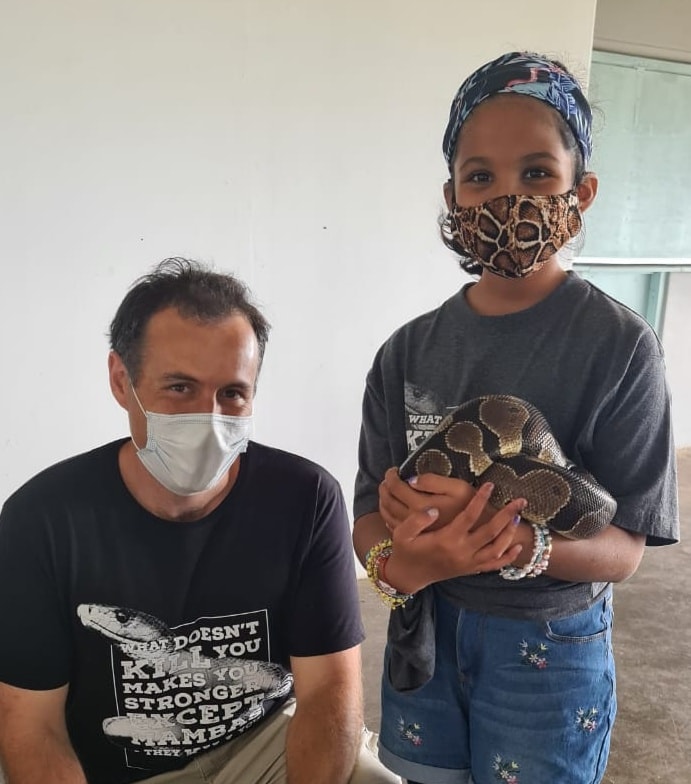
Snakes have always suffered from bad press, starting with the snake in the Garden of Eden. There are many other references to snakes in the Bible and people are quick to quote them and interpret such writings as they deem fit. As there are a number of highly venomous snakes all over the world resulting in more than a million people bitten each year and with around 100 000 fatalities, it is understandable that people are quick to develop a dislike for snakes. Many pets, especially dogs, are also often bitten and killed.
What is rather encouraging is to see the changes in attitude over the past 40 years. More and more people are developing an interest in snakes and our Facebook pages Snakes of Southern Africa and African Snakebite Institute now have over 200 000 members each. The ASI App, ASI Snakes (http://bit.ly/snakebiteapp) has been downloaded by more than 160,000 people. Television programs on snakes, though largely staged and often with doubtful information and advice, have become very popular, especially amongst children. There is hope.
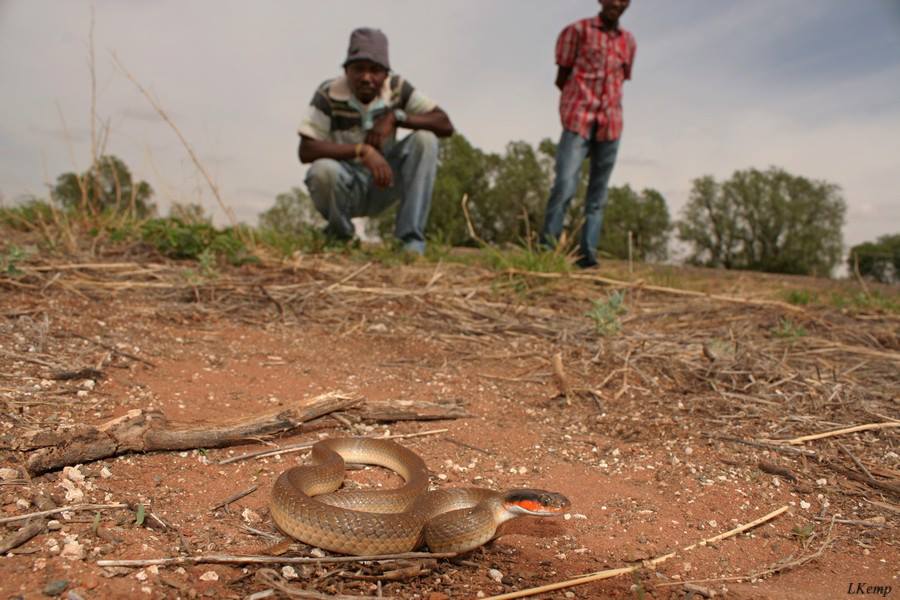
But a fear of snakes is often real and something that we frequently deal with. Many people fear snakes, do not like them or will avoid them if possible. There are also a selection of myths and superstitions about snakes that cause people to fear them. But then there are those that have a phobia, referred to as ophiophobia. These people have an absolute fear of snakes and cannot even look at a snake on television, in a book or magazine. While a large percentage of people have a fear of snakes, there are very few with a phobia.
Phobias are an extreme fear and are often treated as an anxiety disorder. The fear that such people have is out of proportion to the danger posed and may negatively impact on their lifestyle. While it is generally said that such phobias are learnt from relatives and friends, it may be far more complex. Some people are genetically predisposed to phobias while others develop snake phobias from traumatic experiences where they have negative encounters with snakes.
People with ophiophobia often experience what is described as a ‘panic attack’ – excessive sweating, nausea, difficulty breathing and a tight chest, an increased heart rate and even diarrhoea.
Coping with ophiophobia is not easy and treating it even more difficult. We have a number of people who contact us for advice and the best treatment is very slow and low-level exposure to snakes. I have dealt with people where I get them to draw a small piece of rope, then a curved rope and eventually a snake-shaped rope. Then I slowly get them to draw a snake as one would a stick man and we slowly progress from there. We encourage people to attend our snake awareness course during which they learn a great deal about snakes, their behaviour and how little a threat they pose to most people. But it is never easy, and some people may drive halfway to the course and make a U-turn.
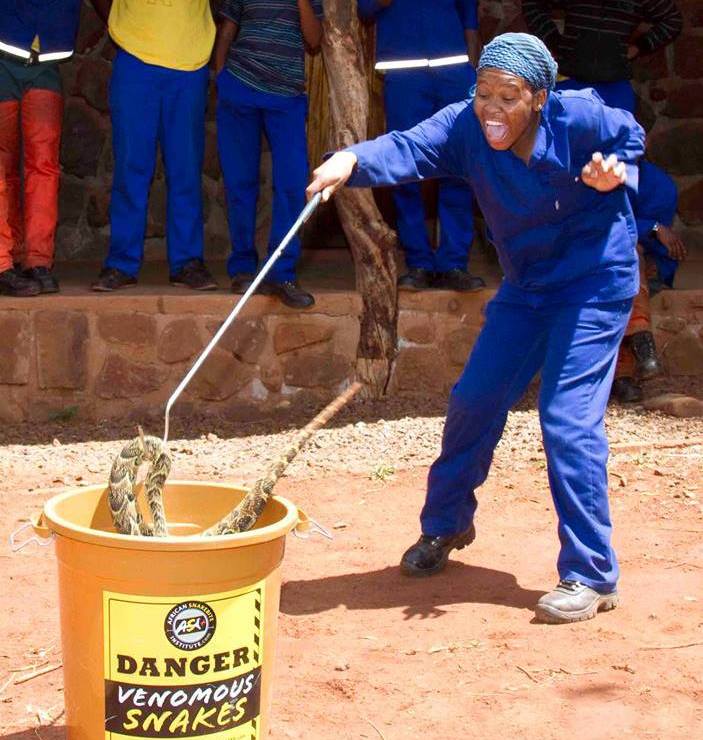
CONTACT US:
Product enquiries:
Caylen White
+27 60 957 2713
info@asiorg.co.za
Public Courses and Corporate training:
Michelle Pretorius
+27 64 704 7229
courses@asiorg.co.za
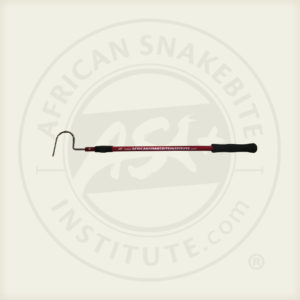 ASI Collapsible Snake Hook - 1.2 m
R650.00
ASI Collapsible Snake Hook - 1.2 m
R650.00
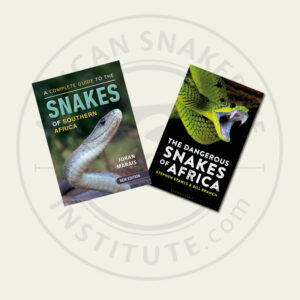 ASI Book Combo 1
ASI Book Combo 1
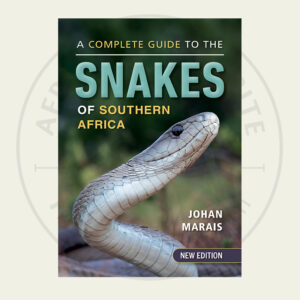 A Complete Guide to the Snakes of Southern Africa - 2022 Edition
R550.00
A Complete Guide to the Snakes of Southern Africa - 2022 Edition
R550.00
Want to attend the course but can’t make it on this date?
Fill in your details below and we’ll notify you when we next present a course in this area:
Want to attend the course but can’t make it on this date?
Fill in your details below and we’ll notify you when we next present a course in this area:
Want to attend the course but can’t make it on this date?
Fill in your details below and we’ll notify you when we next present a course in this area:
Want to attend the course but can’t make it on this date?
Fill in your details below and we’ll notify you when we next present a course in this area:
Want to attend the course but can’t make it on this date?
Fill in your details below and we’ll notify you when we next present a course in this area:
Want to attend the course but can’t make it on this date?
Fill in your details below and we’ll notify you when we next present a course in this area:
Want to attend the course but can’t make it on this date?
Fill in your details below and we’ll notify you when we next present a course in this area:
Want to attend the course but can’t make it on this date?
Fill in your details below and we’ll notify you when we next present a course in this area:
Want to attend the course but can’t make it on this date?
Fill in your details below and we’ll notify you when we next present a course in this area:
Sign up to have our free monthly newsletter delivered to your inbox:
Before you download this resource, please enter your details:
Before you download this resource, would you like to join our email newsletter list?